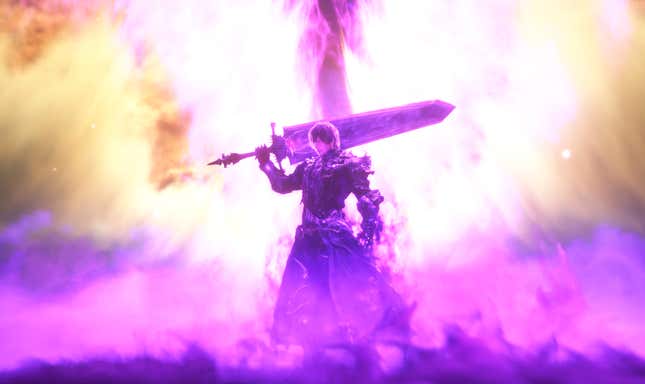
Final Fantasy XIV’s latest expansion, Shadowbringers, brought a sweeping storyline and tons of job adjustments that streamlined how the game played.
Last month, we emailed questions to Final Fantasy XIV director Naoki Yoshida (through Square Enix PR) about class adjustments, roleplaying, and how the game’s music is composed.
Heather Alexandra: One of the goals for redesigning classes in Shadowbringers was “untangling” the complexity that had built up over the years. Now that Shadowbringers has been out, are there any classes where you feel you may have overcorrected? For instance, we saw that Monks were initially less popular until some changes to Greased Lighting and we’re now in the process of seeing Ninjas struggle to find an identity.
Yoshida: This time around, we paid careful attention to decreasing the synergy between certain jobs. Due to that being a focus, I feel we might have been a bit too extreme in trying to prevent any one element causing extreme synergy.
The ninja is representative of that—I don’t think the adjustments went as far as diminishing the job’s identity, but I feel we may have lowered the overall potency of the ninja’s attacks a bit too much in our attempt to balance the strength of Trick Attack. At the same time, due to the higher-level ninjutsu requiring a combination of two (or more) mudras, oftentimes these actions would clip into the global cooldown, creating a frustrating player experience. I do apologize for these issues that occurred. We are working on some major adjustments for Patch 5.1, which will include tweaks to ninja, samurai, and summoner.
Of course, we will perform some fine-tuning to the other jobs as well.
Alexandra: One of the moreem striking things about Shadowbringers was the music. Stormblood had a sweeping, almost operatic tone. Shadowbringers is much more harsh. I wanted to ask about the creation process with Masayoshi Soken; how did the team settle on Shadowbringers’ soundscape?
Yoshida: The overall theme and tone for the music of Shadowbringers were oftentimes conveyed verbally directly from me to Soken (we are both very busy, so a lot of the times we would discuss during smoke breaks). We challenged ourselves to try something different—we deliberately started off with a focus on a rock tone, which is something that may not be typical to Final Fantasy. However, we wanted to bring in that Final Fantasy feeling musically as players delved further into the story.
On the flip side, the requests for creation of each track are requested by the scenario team lead. They will describe what the area is like, what kind of timbre they are going for—for example, should the track have a subdued feeling, should it feel decadent, etc.
What is especially important to creation of these tracks is the backbone of the story we’re telling in each particular scene. The sound of a ticking clock in Amaurot was proposed by Soken, after taking inspiration from the tragic reality that the area was recreated by stopping time using creation magicks.
That’s generally the Soken approach to sound design: understanding the scenario and gameplay experience, as described by those creating the other elements, and then creating the pieces.
Alexandra: This is a question on behalf of the game’s roleplaying community. Many players, who do not act as if they are the Warrior of Light, but rather pretend to be everyday adventurers, were excited to create stories that take place on the First but saw that the game’s narrative didn’t really allow travel for “normal” individuals to end up there. If players want to pretend their “normal” characters can travel to and play on the First, is that okay? (I promise this is a question that many of them eagerly await an answer to.)
Yoshida: Hrm… Personally, I see video games as something that gives you the freedom to play however you like. So, if you, the player, believe that you can travel to the First, then so be it, right?
We have yet to reveal everything about who the Warrior of Light is, and whether they are the only ones who are special. Furthermore, the definition of a “normal individual” seems a bit vague here, as well. I think the power to believe and the desire to persevere are the biggest elements that drive progress in an individual, and so if you believe that you as a character can go to the First, then wouldn’t that be enough? A life dictated by someone else is no fun anyhow, is it?